 W
WChristian poetry is any poetry that contains Christian teachings, themes, or references. The influence of Christianity on poetry has been great in any area that Christianity has taken hold. Christian poems often directly reference the Bible, while others provide allegory.
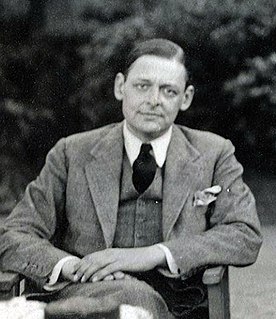 W
WBurnt Norton is the first poem of T. S. Eliot's Four Quartets. He created it while working on his play Murder in the Cathedral, and it was first published in his Collected Poems 1909–1935 (1936). The poem's title refers to the manor house Eliot visited with Emily Hale in the Cotswolds. The manor's garden serves as an important image within the poem. Structurally, the poem is based on Eliot's The Waste Land, with passages of the poem related to those excised from Murder in the Cathedral.
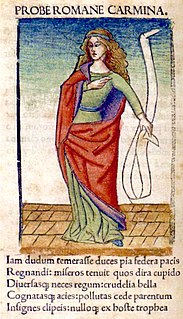 W
WCento Vergilianus de laudibus Christi is a Latin poem arranged by Faltonia Betitia Proba after her conversion to Christianity. A cento is a poetic work composed of verses or passages taken from other authors and re-arranged in a new order. This poem reworks verses extracted from the work of Virgil to tell stories from the Old and New Testament of the Christian Bible. Much of the work focuses on the story of Jesus Christ.
 W
W"The Circus of the Sun" is a poem by American poet Robert Lax (1915-2000). First published in 1959 by Journeyman Press it consists of a cycle of 31 short poems that tell the story of a traveling circus. The poem is included in the collections: 33 Poems (1987), Love Had a Compass (1997) and Circus Days and Nights (2000).
 W
WThe Commonitorium is the name of a c. AD 430 poem by the Latin poet and Christian bishop Orientius. Written in elegiac couplets, the Commonitorium is made up of 1036 verses and has traditionally been divided into two books. The poem is hortatory and didactic in nature, describing the way for the reader to attain salvation, with warnings about the evils of sin.
 W
WThe conversation poems are a group of at least eight poems composed by Samuel Taylor Coleridge (1772–1834) between 1795 and 1807. Each details a particular life experience which led to the poet's examination of nature and the role of poetry. They describe virtuous conduct and man's obligation to God, nature and society, and ask as if there is a place for simple appreciation of nature without having to actively dedicate one's life to altruism.
 W
WThe Davidiad is the name of an heroic epic poem in Renaissance Latin by the Croatian national poet and Renaissance humanist Marko Marulić. Likely finished in AD 1517, the poem, as its Latin title suggests, details the ascension and deeds of David, the second king of the United Kingdom of Israel and Judah, who is said to have reigned c. 1010–970 BC.
 W
W"The Day of Doom: or, A Poetical Description of the Great and Last Judgment" is a religious poem by clergyman Michael Wigglesworth that became a best-selling classic in Puritan New England for a century after it was published in 1662 by Samuel Green and Marmaduke Johnson. The poem describes the Day of Judgment, on which a vengeful God judges and sentences all men, going into detail as to the various categories of people who think themselves excusable who will nonetheless end up in Hell. The poem was so popular that the early editions were thumbed to shreds. Only one fragmentary copy of the first edition is known to exist, and second editions are exceptionally rare.
 W
WThe Divine Comedy is a long Italian narrative poem by Dante Alighieri, begun c. 1308 and completed in 1320, a year before his death in 1321. It is widely considered the pre-eminent work in Italian literature and one of the greatest works of world literature. The poem's imaginative vision of the afterlife is representative of the medieval worldview as it had developed in the Western Church by the 14th century. It helped establish the Tuscan language, in which it is written, as the standardized Italian language. It is divided into three parts: Inferno, Purgatorio, and Paradiso.
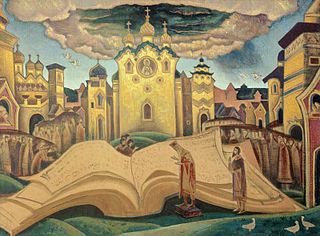 W
WThe Verse about the Book of the Dove is a medieval Russian spiritual verse. At least 20 versions are known. They vary in length from 30 to over 900 lines. The poem is generally thought to have been written ca. 1500 in the Novgorod region, though Russian nationalists postulate its great antiquity. The earliest extant manuscript is dated to the 17th century.
 W
WThe Dream of the Rood is one of the Christian poems in the corpus of Old English literature and an example of the genre of dream poetry. Like most Old English poetry, it is written in alliterative verse. Rood is from the Old English word rōd 'pole', or more specifically 'crucifix'. Preserved in the 10th-century Vercelli Book, the poem may be as old as the 8th-century Ruthwell Cross, and is considered one of the oldest works of Old English literature.
 W
WDrinkers Masses, to include Gamblers Masses, was a genre of medieval Latin poetry which parodied the Roman Catholic Latin Mass in order to make fun of drinking and gambling monks and clerics. These masses were written between about 1100 to 1700 by clerici vagantes, with the first example being the gamblers mass, found in the Carmina Burana. The genre is somewhat related to other medieval ecclesiastic parody, such as the Feast of Fools and the Feast of the Ass.
 W
WThe Dry Salvages is the third poem of T. S. Eliot's Four Quartets, marking the beginning of the point when the series was consciously being shaped as a set of four poems. It was written and published in 1941 during the air-raids on Great Britain, an event that threatened him while giving lectures in the area. The title comes from the name of a marine rock formation off the coast of Cape Ann, Massachusetts, where he spent time at as a child.
 W
WFour Quartets is a set of four poems written by T. S. Eliot that were published over a six-year period. The first poem, Burnt Norton, was published with a collection of his early works After a few years, Eliot composed the other three poems, East Coker, The Dry Salvages, and Little Gidding, which were written during World War II and the air-raids on Great Britain. They were first published as a series by Faber and Faber in Great Britain between 1940 and 1942 towards the end of Eliot's poetic career The poems were not collected until Eliot's New York publisher printed them together in 1943.
 W
WThe French Revolution is a poem written by William Blake in 1791. It was intended to be seven books in length, but only one book survives. In that book, Blake describes the problems of the French monarchy and seeks the destruction of the Bastille in the name of Freedom.
 W
W"Herr, stärke mich, dein Leiden zu bedenken" is a Passion hymn in German, written by Christian Fürchtegott Gellert to the melody of "Herzliebster Jesu", and first published in 1757. It is contained in the German Protestant hymnal Evangelisches Gesangbuch.
 W
WThe Hind and the Panther: A Poem, in Three Parts (1687) is an allegory in heroic couplets by John Dryden. At some 2600 lines it is much the longest of Dryden's poems, translations excepted, and perhaps the most controversial. The critic Margaret Doody has called it "the great, the undeniable, sui generis poem of the Restoration era…It is its own kind of poem, it cannot be repeated ."
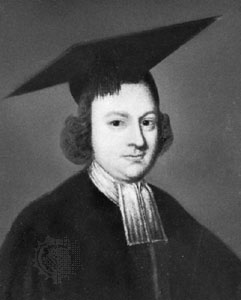 W
WHymns and Spiritual Songs for the Fasts and Festivals of the Church of England, by Christopher Smart, was published in 1765, along with a translation of the Psalms of David and a new version of A Song to David. He wrote these poems while he was in a mental asylum and during the time he wrote Jubilate Agno.
 W
WHymns for the Amusement of Children (1771) was the final work completed by English poet Christopher Smart. It was completed while Smart was imprisoned for outstanding debt at the King's Bench Prison, and the work is his final exploration of religion. Although Smart spent a large portion of his life in and out of debt, he was unable to survive his time in the prison and died soon after completing the Hymns.
 W
WJoan of Arc is a 1796 epic poem composed by Robert Southey. The idea for the story came from a discussion between Southey and Grosvenor Bedford, when Southey realised that the story would be suitable for an epic. The subject further appealed to Southey because the events of the French Revolution were concurrent to the writing of the poem and would serve as a parallel to current events. Eventually, Samuel Taylor Coleridge helped rewrite parts of the poem for a 1798 edition. Later editions removed Coleridge's additions along with other changes.
 W
WJubilate Agno is a religious poem by Christopher Smart, and was written between 1759 and 1763, during Smart's confinement for insanity in St. Luke's Hospital, Bethnal Green, London. The poem was first published in 1939, under the title Rejoice in the Lamb: A Song from Bedlam, edited by W. F. Stead from Smart's manuscript, which Stead had discovered in a private library.
 W
WKing Alfred is an epic poem by John Fitchett and completed by Robert Roscoe, published in 1841 and 1842.
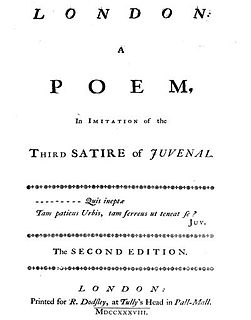 W
WLondon is a poem by Samuel Johnson, produced shortly after he moved to London. Written in 1738, it was his first major published work. The poem in 263 lines imitates Juvenal's Third Satire, expressed by the character of Thales as he decides to leave London for Wales. Johnson imitated Juvenal because of his fondness for the Roman poet and he was following a popular 18th-century trend of Augustan poets headed by Alexander Pope that favoured imitations of classical poets, especially for young poets in their first ventures into published verse.
 W
WMadoc is an 1805 epic poem composed by Robert Southey. It is based on the legend of Madoc, a supposed Welsh prince who fled internecine conflict and sailed to America in the 12th century. The origins of the poem can be traced to Southey's schoolboy days when he completed a prose version of Madoc's story. By the time Southey was in his twenties, he began to devote himself to working on the poem in hopes that he could sell it to raise money to fulfill his ambitions to start a new life in America, where he hoped to found Utopian commune or "Pantisocracy". Southey finally completed the poem as a whole in 1799, at the age of 25. However, he began to devote his efforts into extensively editing the work, and Madoc was not ready for publication until 1805. It was finally published in two volumes by the London publisher Longman with extensive footnotes.
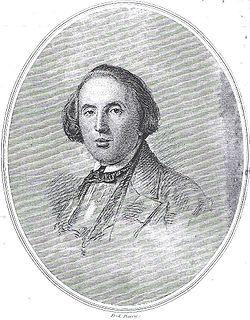 W
WMormon poetry is poetry written by members of The Church of Jesus Christ of Latter-day Saints about spiritual topics or themes.
 W
WOn the Morning of Christ's Nativity is a nativity ode written by John Milton in 1629 and published in his Poems of Mr. John Milton (1645). The poem describes Christ's Incarnation and his overthrow of earthly and pagan powers. The poem also connects the Incarnation with Christ's Crucifixion.
 W
WThe Parables of Our Lord and Saviour Jesus Christ Done into Familiar Verse, with Occasional Applications, for the Use and Improvement of Younger Minds was written by Christopher Smart and published in 1768. The Parables are a collection of parables from the Bible which includes lessons from both the Old and New Testament.
 W
WParadise Lost is an epic poem in blank verse by the 17th-century English poet John Milton (1608–1674). The first version, published in 1667, consists of ten books with over ten thousand lines of verse. A second edition followed in 1674, arranged into twelve books with minor revisions throughout. It is considered to be Milton's masterpiece, and it helped solidify his reputation as one of the greatest English poets of his time. The poem concerns the biblical story of the Fall of Man: the temptation of Adam and Eve by the fallen angel Satan and their expulsion from the Garden of Eden.
 W
WParadise Regained is a poem by English poet John Milton, first published in 1671. The volume in which it appeared also contained the poet's closet drama Samson Agonistes. Paradise Regained is connected by name to his earlier and more famous epic poem Paradise Lost, with which it shares similar theological themes; indeed, its title, its use of blank verse, and its progression through Christian history recall the earlier work. However, this effort deals primarily with the temptation of Christ as recounted in the Gospel of Luke.
 W
WThe anonymous poem Pascon agan Arluth is the oldest complete literary work in the Cornish language, dating from the 14th century. The modern title means "The Passion of Our Lord", but the poem has also been published as Mount Calvary.
 W
WPearl is a late 14th-century Middle English poem that is considered one of the most important surviving Middle English works. With elements of medieval allegory and dream vision genre, the poem is written in a North-West Midlands variety of Middle English and highly—though not consistently—alliterative; there is a complex system of stanza linking and other stylistic features.
 W
WPiers Plowman or Visio Willelmi de Petro Ploughman is a Middle English allegorical narrative poem by William Langland. It is written in un-rhymed, alliterative verse divided into sections called passus.
 W
WThe Prick of Conscience is a Middle English poem dating from the first half of the fourteenth century promoting penitential reflection. It is, in terms of the number of surviving manuscripts, the best attested poem written in English before print, with over 130 known copies.
 W
WRoderick the Last of the Goths is an 1814 epic poem composed by Robert Southey. The origins of the poem lie in Southey's wanting to write a poem describing Spain and the story of Rodrigo. Originally entitled "Pelayo, the Restorer of Spain," the poem was later retitled to reflect the change of emphasis within the story. It was completed after Southey witnessed Napoleon's actions in Europe, and Southey included his reactions against invading armies into the poem. The poem was successful, and multiple editions followed immediately after the first edition.
 W
WThe Seatonian Prize is awarded by the University of Cambridge for the best English poem on a sacred subject. This prize has been awarded annually since 1750 and is open to any Master of Arts of the university. Lord Byron referred to this prize in his 1809 poem entitled 'English Bards and Scots Reviewers.' The prize is still awarded annually, with a deadline of 30 September each year. It is open to all members of the Senate of the University of Cambridge, and all persons who are possessors of the status of Masters of Arts.
 W
W"Take Up Thy Cross, The Saviour Said" is an American Christian hymn written by Charles W. Everest. It was originally a poem published in 1833 but was later altered to become a hymn. It was then edited by English hymnwriter Sir Henry Baker for inclusion in the Church of England's Hymns Ancient and Modern hymnal.
 W
WThe Vanity of Human Wishes: The Tenth Satire of Juvenal Imitated is a poem by the English author Samuel Johnson. It was written in late 1748 and published in 1749. It was begun and completed while Johnson was busy writing A Dictionary of the English Language and it was the first published work to include Johnson's name on the title page.
 W
WThe Vision of Dorotheus or Dorotheos is an autobiographical Homeric Greek poem, composed in 343 lines of dactylic hexameter and attributed to "Dorotheus, son of Quintus the Poet". The poem chronicles a vision, wherein the author is transported to the Kingdom of Heaven and finds himself in its military hierarchy. He is conscripted into and deserts his post, only to receive punishment, be forgiven, and rediscover his Christian faith. The poem, penned sometime in the 4th-century, depicts the Kingdom of Heaven in an Imperial fashion; Christ is enthroned as emperor, surrounded by angels bearing Roman military and official titles, with the military structures of the Kingdom of Heaven modelled on those of Rome.